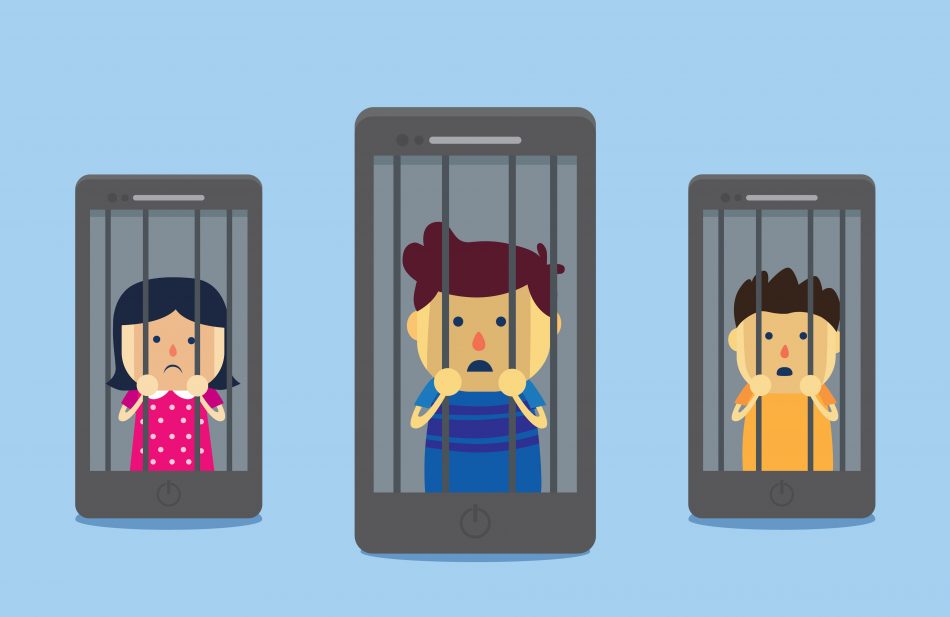
UNDER DIGITAL THREAT: MUSLIM CHILDREN’S SPIRITUALITY
Digital technology is entrenched in the way we live. We feel its huge benefits and enjoy its hyper-convenience. In today’s post-COVID world, this is truer than ever. Our work, studies, and socials are powered by Zoom. By now, most of us have heard about the potential harms of digital technology for children. The rapid advancement in technology means we are the first generation of parents who must navigate how to effectively manage our children’s relationship with digital devices.
In the Muslim community, however, we must consider the additional layer of how heavy technology use may taint the spiritual development of the children we hope to nurture into confident and productive believers.
The commonly accepted perils of heavy tech use for kids include:
- Increased inattention, impulsivity, and poor short-term memory, leading to behavioural and learning difficulties
- Relationship and social skills issues. Frequent device usage leads to a decrease in real-time offline activities with family and friends
- Exposure to inappropriate content, whether in the form of violence, pornography, or disinformation. Unfiltered content can harm children who do not have the intellectual or emotional capacity to critically engage with the content they are consuming
- Sleep problems. Using devices before bed means blue light emitted from screens interferes with the sleep cycle in the brain and can lead to long-term insomnia
- Issues with fine motor skills, affecting coordination, handwriting, and sports that involve hand-eye coordination
- Obesity (already on the rise in young children) is a heightened risk due to sedentary device use taking the place of traditional recreation.
For children, digital technology is often their first exposure to addictive media, so the way in which they are taught to manage this responsibly can set them up for their future experiences as an adult, whether it is mastering discipline or being thrown head-first into the pitfalls of addiction. All of these topics have been discussed by leaders in the fields of child development, education, and technology, and it is a duty upon us as parents to be cognisant of them.
However, the focus of this article is on another avenue of potential harm: how digital tech can seriously hinder a Muslim child’s spiritual and emotional development.
The cost of hyperstimulation on spiritual growth
Everything is just so fun and shiny online! The market of edutainment and interactive learning tailored towards children is booming. Creative tech minds have put together user experiences that are borderline enthralling for children. There are points, constant rewards, and reinforcement at every turn. It’s all colourful, fun, and feels so good – you can almost see the dopamine rush flood their little brains.
Have you ever noticed, as a result, how very boring and dry traditional offline learning can be? When a child becomes accustomed to a premium experience of non-stop gratification, it becomes difficult to wean the brain off that level of engagement back to real living and slow learning.
Much of the spiritual objectives that exist for believers (children and adults alike) work in slow, conscious, and contemplative mental spaces.
These include:
- The focused concentration required to memorise Qur’ān and the discipline required to repeatedly revise what has been memorised .
- The tadabbur we want to encourage our children to cultivate as a habit, even when it starts with “think about the things you are grateful for”, “think about the amazing way the orbit of the planets work”, or “think about the ways great things come out of ‘bad’ situations”. The key word here is think. Reflection takes time, as well as silence and the comfort of one’s own mental company.
- Doing adhkār with presence of heart. It takes real channelling into oneself to repeat seemingly simple words like Subhān Allāh, Alhamdulillāh, Allāhu akbar, and to unravel new layers of meaning in each of these words every time. Children are at the peak of their creative power in their early years, so this is not a mammoth task for them per se. Nurturing their mindset for them to dedicate to this act is essential to making it happen.
- Meaningful and connected du’ā. Feeling the vulnerability in du’ā and following the prescribed etiquette of a sincere and connected call to one’s Lord involves clearing the mental debris and focusing the eye of the heart attentively to the task at hand.
The ever-decreasing attention spans of children make it seem nigh impossible to achieve the above. The good news is that children’s brains have been created for the real-time and relaxed pace of everyday offline living. Returning to a slower pace is actually more in line with their natural state. Hyper-stimulation and instant gratification, on the other hand, are learned, repeated, and reinforced modes of being.
Wind things right back.
Allow your children to be bored. Remove the excess. Clear their mental landscape by reducing the clutter of the scenery. Children accustomed to heavy tech use will obviously react with resistance (and possibly horror) at the idea of being unplugged and being encouraged to just sit and think. It requires discipline and will take time and guidance. It will need you as a parent to be understanding and patient as you guide your child through this new terrain that they may be reluctant to venture into. However, these are habits to be nurtured. The initial ‘withdrawal’ will inevitably come to pass before they can be recalibrated. Encourage offline resourcefulness and creativity. Schedule in times to just talk, even if it’s saying “let’s meet on the sofa at 3:00pm”. Children need to learn that the yearnings of the soul are subtle, and until all the clatter around it is silenced, they will not be able to listen in sharply enough.
Being consumed in an online reality
Gone are the days when you would say goodbye to your friends at the school gates and reconvene the next day during registration. Nowadays, friendships just do not (and cannot) be switched off at the end of the school day. We are constantly connected to the drama, conversations, banter, and even bullying in an unprecedented way. The natural shift in socialising with school friends to being with family in a different kind of environment has become blurred. New norms of communication have been established where one can remain consumed by peer-group antics without a pause button. With increasingly pressured lives, the severing of real-time family bonds harms not only individual relationships, it reforms the entire culture of a household.
The role of parents in fulfilling a moderating and advisory role for their children is being slowly eroded away, and with it certain protections also disappear. As is commonly known in psychology, we become like those who we spend the most time with.[1] This echoes the sentiment of the hadith “you are on the deen of your friends”[2] and many traditions point to how the company one keeps reveals almost everything of who and what they are.
When those people in your online world become peers who are equally as lost and searching as you are, the anchoring of your family is more crucial than ever. The disconnect between parents and children easily happens even while they are sitting on the same dinner table. We live in a reality where members of a household can be having entirely unrelated conversations and consuming individualised content that the others are not even aware of.
It used to take a village to raise a child, but we do not have the village anymore. Maybe we can compensate for this by having parents invest more time in their children. What if though, the immersion in tech devices means that moments of connection no longer exist, are not pleasurable, or are plain awkward? Communication does not break down from one dramatic event, but instead from the alienation and emotional distance that slowly creeps in between people. Heavy device use can amplify this disconnect and result in consequences we do not fully comprehend yet.
Research suggests heavy tech use interrupts children’s ability to read human emotions. Being absorbed by screens mean children struggle to interpret facial expressions or tell the difference between a worried or upset tone for example. This is a direct result of less real face-to-face human interaction where we learn all these subtle non-verbal cues. Hearing this, you can understand where the caricatures of ‘digital zombies’ emanate from.[3]
Ways towards a healthier relationship with tech
There is no magic wand to effortlessly fix the internal culture of households. There will be wrangling, mistakes made, misunderstandings, and possibly conflict too. However, there are a few keys things that can help in regulating children’s use of devices and implement better and healthier habits:
Be on the same page as parents
For any decision to be implemented successfully, there must be a united stance that both parents abide by. Couples should discuss their ambitions for their children, their lifestyle demands, and what they are able to facilitate. Talk about how to mitigate potential influence from the extended family or different environments where others may have different attitudes towards giving children tech devices. There are plenty of resources today to educate parents about technology use for children, and similar resources for Muslim parents on the effective habits and spiritual tarbiyah to inculcate into children. Learn together. You may not agree on every point, but there must be a basic buy-in from both parents on this topic as children cannot afford to sense disunity between parents.
Agree on boundaries with children and enforce them together
The next step is then presenting this plan to your family unit. Discuss and make decisions around time spent on devices, where they are kept, and how they are used. Keep this an open conversation and allow children to feel part of the decision-making process. When they feel they have had a say and have been heard, they are much more likely to stick by the rules. In the same conversation, get them to agree to consequences for not sticking by agreed guidelines.
There are many apps now geared towards helping your child memorise Qur’ān, or learning Arabic and Islamic topics. No doubt these are hugely beneficial for parents who do not feel they have the time or skills to teach their children, but remember to put these conveniences in their place. There is great value in deliberately ensuring real-time face-to-face instruction for Islamic topics. The relationship and dynamics between teacher and student are not something that can be wholly replaced or compensated for by technology, so decide the right balance for your family.
Play, learn, and watch content alongside your children
This can be a type of bonding: you get the opportunity to share your child’s interest, you learn from the interaction, and you can keep an eye on what engages them. If they have a particular skill you know nothing about, ask them to teach you. Let them occupy the role of ‘teacher’ and show them that they have a valuable role and that lifelong learning is for everyone. This is vastly different from using technology as a digital pacifier for children, and can make it a productive family affair.
Have open and age-appropriate conversations
These discussions could be about the addictive nature of technology. Understand that the addictive design is a feature, not a ‘bug’, and ask for their thoughts on this. When appropriate, talk about online safety, the dark web, social media pressures, and coming across inappropriate content. Observe, converse, and engage with them continuously so that you become their first port of call when they come across something they feel is potentially harmful. Talk about new trends or viral content they have come across, and ask their opinions on such content. Keep technology open and relatable in conversations.
Be a role model
When you are with your children, really be with them. Put your phone under your pillow upstairs or leave it well out of the way. Do not allow them to make the connection that screens are a grown-up privilege that they are being denied. Model the behaviours you would love for them to inculcate, whether that is reading (physical!) books, having stimulating conversations, or engaging in creative outdoor activities. Involve them in discussions about how they feel when they make du’ā, what a certain verse of the Qur’ān means to them, or what kinds of things help them focus in prayer better. Normalise the conversations around pondering and reflecting until it becomes something on their mental radar at the very least.
The responsibility might feel a little too heavy right now as technology has become a crutch many families rely on in the homebound COVID reality of this year. Begin by going for a small and easy win – something as simple as a 15-minute one-to-one chat before bed. Make a single change to reduce screen-time use by replacing it with a shared offline activity. Continue with this one small change until it becomes a habit and in shā Allāh opens the doors to more changes in a similar vein.
Watch for emotional and behavioural signs of tech addiction
Be aware of when children start to have an unhealthy relationship with technology. This might be when offline activities start being replaced with wanting to cosy up with a tablet, sleeping late with a device as bedtime company, not engaging in family gatherings because of wanting to be with their device, or extreme anxiety at the thought of being separated from their device. It might even be more subtle things like drama online that sours their offline mood to the extent that they have trouble disentangling their online experiences from their offline lives.
A Final Word
Technology is an incredibly powerful tool, and with it comes huge responsibility in giving it an appropriate place in our daily lives. When children have not yet developed self-regulation or self-discipline, you can understand why tech consumption is likened to ‘digital heroin’ for children.
To nurture balanced and wholesome human beings, technology should be a small and controlled portion of a much wider learning experience for children. Spiritual growth and tarbiyah must be given the space, time, and silence to take root in a child’s life. Human engagement with family, friends, and the community – together with hands-on learning, outdoor recreation, and development of ‘soft skills’ – are all part of the very broad menu of healthy development that we owe to our children. In a world that is increasingly geared towards growth, output, productivity, and speed, we must actively take back the right to be slow, considered, and still. It is exactly there that the soul finds life
Notes:
[1] https://www.developgoodhabits.com/five-people/ [2] Tirmidhi [3] https://www.forbes.com/sites/amymorin/2014/08/26/is-technology-ruining-our-ability-to-read-emotions-study-says-yes/This article originally appeared here.



